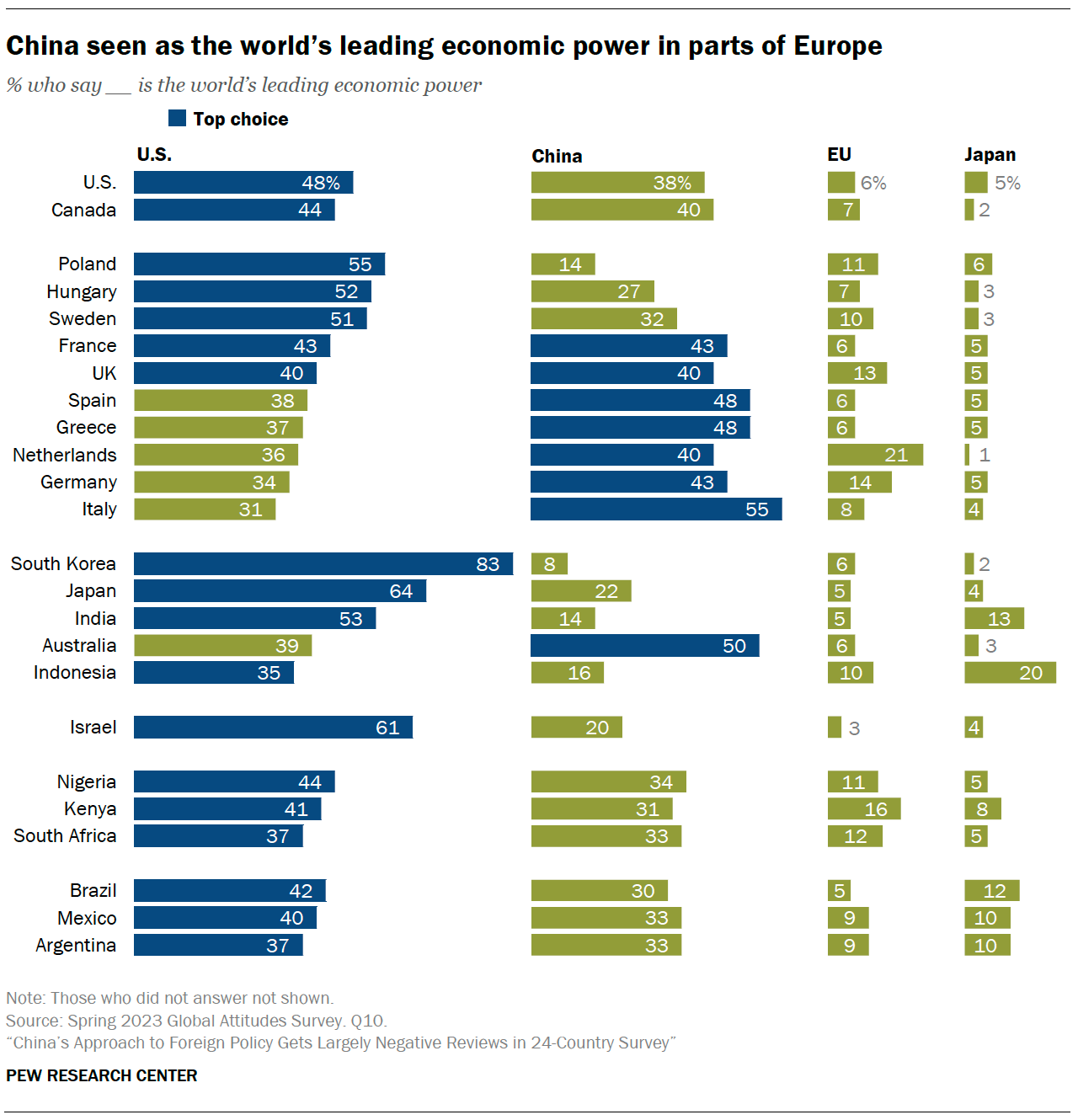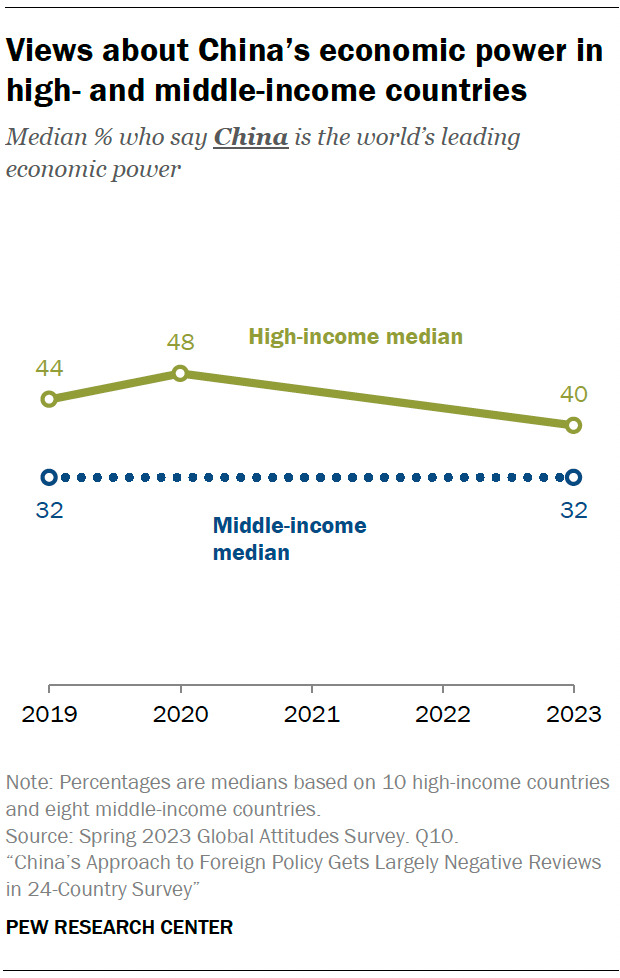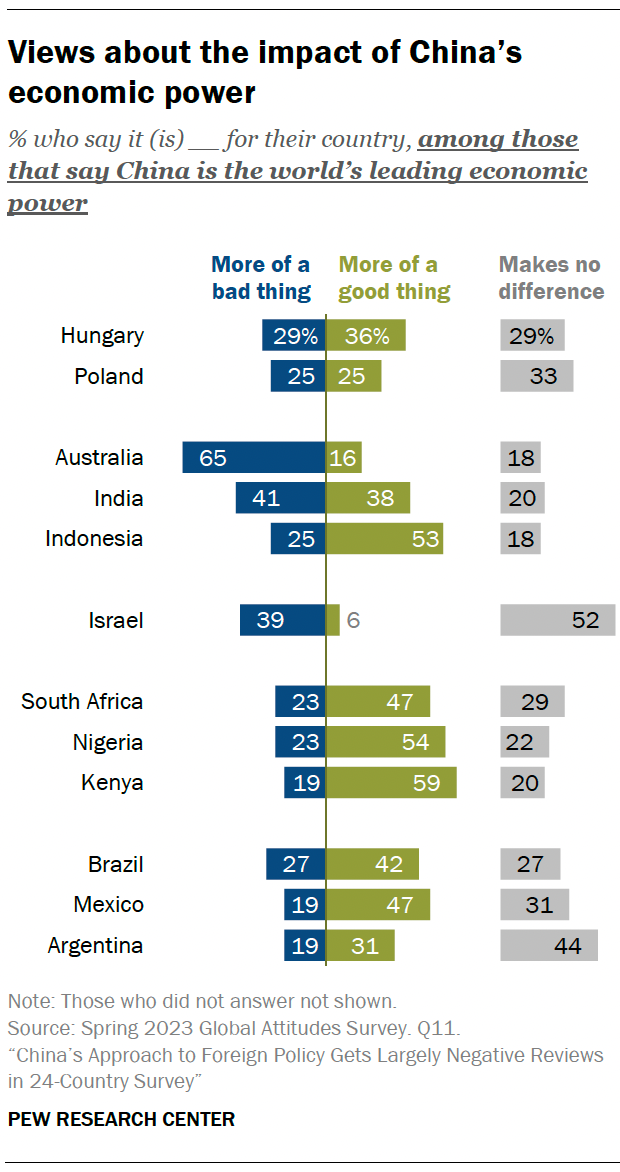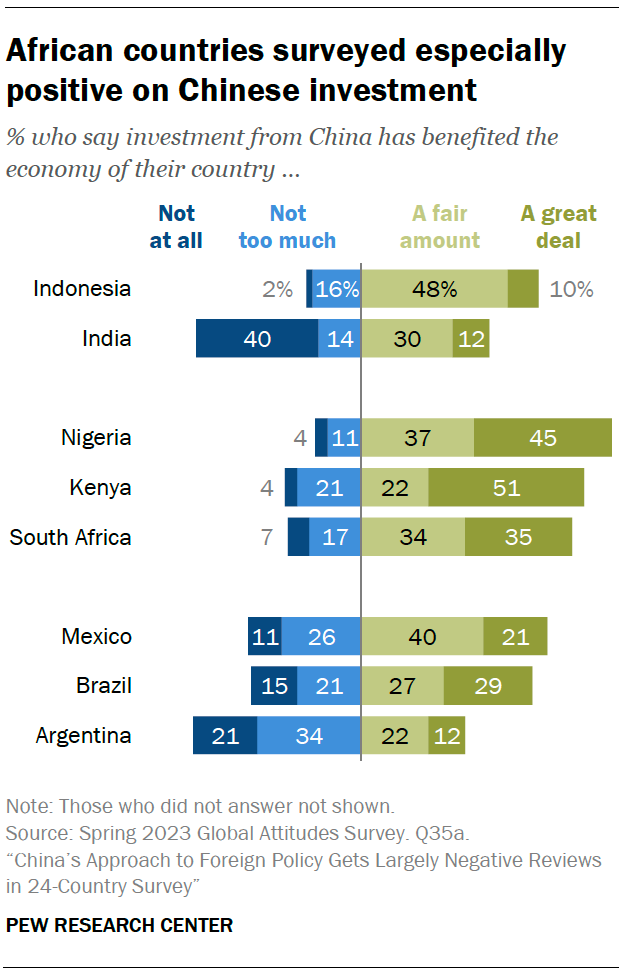Only around a third of the 24 countries surveyed see China as the world’s leading economic power. Most other countries – including all middle-income countries surveyed – give that title to the U.S.

People in Australia, Germany, Greece, Italy, the Netherlands and Spain – all high-income countries – name China as the world’s top economy. In France and the UK, equal shares name China and the U.S. Italy especially stands out as the only country where more than half say that China is the world’s leading economic power. Italy switched to seeing China and not the U.S. as the world’s leading economic power in 2020, one year after the country’s ascension into the Belt and Road Initiative.
South Koreans are the least likely to see China as the preeminent economy, choosing the U.S. by 75 percentage points. Differences of more than 40 percentage points on this question, in favor of the U.S., are also present in Israel (+41), Poland (+41) and Japan (+42).
Views are somewhat mixed in Argentina, Canada, France, the Netherlands, South Africa and the UK. In these six countries, roughly equal shares name both the U.S. and China as the top economy.
How opinions about which country is the world’s top economy have changed in recent years

In around half of the countries surveyed, people are less likely than they were a few years ago to name China as the world’s leading economic power. These changes have primarily occurred in high-income countries. In Sweden, for example, 32% say China is the top economy, down from 47% in 2019. Swedes are now more likely to name the U.S. than China as the world’s leading economic power. Even in Australia, where more name China than the U.S. as the top economy, the share who holds this view has gone down by 5 percentage points since June 2020.
Views of the international balance of economic power have changed little in most middle-income countries surveyed. As was the case in 2019, those in Brazil, India, Kenya and Mexico continue to see the U.S. as the top economy, while those in South Africa and Argentina are about as likely to name the U.S. as they are China. Indonesia stands out for an 8-point decline in the share who considers China the leading economy.
The sense that China is the leading economic power around the world is tied to pessimism about domestic economics. People who say their country’s economic situation is bad are more likely to name China as the world’s leading economic power in 11 countries, all of which are high-income countries. (They are also less likely to name the U.S. as the world’s top economy.)
In Italy, the only country where a majority says China is the world’s leading economy, for example, 59% of those who think the Italian economy is doing poorly say China is the world’s greatest economic power, compared with 44% of those who think Italy’s economy is doing well. And 29% of Italians who feel negatively about their economy consider the U.S. the top economic power compared with 39% of those who feel positively.

Many who see China as the world’s leading economic power also see it as a good thing
In 12 countries, people who named China as the world’s leading economic power were asked if that is more of a good or bad thing for their country.2 On balance, more say this is a good than bad thing for their country. Substantial shares of a fifth or more in most countries also offer that China’s position as the leading economic power makes no difference.
Among those who see China as the world’s leading economic power, Kenyans, Nigerians and Indonesians are most likely to view China’s economic preeminence as good for their country. About half or more in the three countries hold this view.
Australians who think China is the world’s leading economic power are the most likely to say this is a bad thing for their country.
Chinese investment seen as an economic benefit

In most of the of eight middle-income countries surveyed, at least half say investment from China has benefited their country’s economy. People in the three African countries surveyed are particularly enthusiastic about investment from China. About two-thirds or more in each country consider Chinese investment a benefit to their domestic economy, including at least a third who say the investment has benefited their economy a great deal.
India and Argentina stand out for having more than half who believe Chinese investment has not been good for their country’s economy. Indians are the most skeptical of Chinese investment: 40% say investment from China has not at all benefited India’s economy.
Perceptions of China’s investments are related to views of its economic power and its overall image. In nearly all middle-income countries surveyed, those who say Chinese investments benefit their economy at least a fair amount are more likely to name China as the world’s leading economic power. They are also more likely to hold favorable views of China than those who do not see Chinese investment as a benefit for their economy.
In many countries, those with more education are more likely than those with less to see investment from China as a benefit for their economy. They are also more likely to offer a response to the question. In Indonesia, Mexico, and South Africa, younger adults ages 18 to 39 are more likely to see Chinese investment as a benefit than adults 40 and older.
Americans, for their part, think Chinese foreign aid and investment from Chinese companies both benefits and harms developing countries. While they broadly say the same about American investment, they are more likely to see American money benefiting developing countries than Chinese money. For more, read “Americans see U.S. aid to developing countries as more beneficial than Chinese assistance.”


